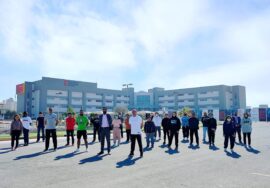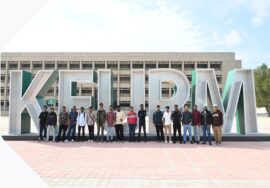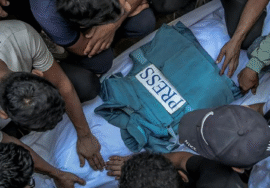
Mohammad Saad – Tumor Inflammation & Immunotherapy Researcher at Adelaide
Introduction: Advancing Cancer Biology from Down Under
In the complex world of cancer research, where every discovery may lead humanity closer to better treatments and understanding, some scientists stand out by the depth and alignment of their work. Mohammad Saad (commonly known in academic profiles as Mohamed Saad), currently an Early Career Researcher (ECR) in Tumour Inflammation & Immunotherapy at the South Australian ImmunoGENomics Cancer Institute (SAiGENCI), University of Adelaide, is one such figure. His research into proteases, cytokine signaling, cell proliferation, and inflammation places him at the intersection of molecular biology and translational oncology. With 37 publications, multiple fellowships and awards, and an active role in supervising new researchers, Saad’s career trajectory showcases how passion, scientific rigor, and global collaboration combine to push the frontiers of cancer research.
Academic Background & Career Journey
Mohammad Saad completed his PhD in 2019 at Monash University, Australia. His doctoral work laid the foundation for his specialization in tumor biology, inflammatory signaling, and protease function. Before that, he earned his M.Sc. (2011–2014) and B.Sc. (2005–2010) in Egypt from Alexandria University. This international foundation Egypt for early training, Australia for advanced research enriched his perspective and enabled him to operate with global scientific fluency.
After his PhD, he held a postdoctoral scientist position at the Hudson Institute of Medical Research from 2019 to 2023, contributing to tumor biology, immunological signaling, and collaborative projects across institutions.
Today, at Adelaide, he serves as a researcher specializing in tumor inflammation and immunotherapy, part of the SAiGENCI group in the Faculty of Health and Medical Sciences. His appointment allows him to supervise both Master’s and PhD students, extending his influence into training the next generation of cancer biologists.
Research Focus, Interests & Expertise
Mohammad Saad’s research interests are both broad and deep. They include:
- The roles of ADAM17 protease in disease, particularly cancer
- Rhomboid pseudoproteases and their regulatory or signaling roles
- IL-6 cytokine signaling in dysregulated cell proliferation, inflammation, and cell death
- Cross-talk among inflammation, tumor microenvironment, and oncogenic signaling
- Translational oncology, bridging molecular insights to therapeutic targets
By focusing on proteases such as ADAM17, which are known to cleave membrane-bound molecules and activate signaling cascades, Saad is investigating how these molecular scissors influence tumor growth, metastasis, and immune modulation. In diseases like lung cancer, his work aims to reinterpret how inflammatory axes drive malignancy not just as a consequence but as a contributing factor in disease progression.
His interest in rhomboid pseudoproteases further reflects a nuanced approach: while classical proteases receive a lot of attention, pseudoproteases (which lack catalytic activity) often regulate signaling by modulating partners or scaffolding functions. Exploring these “silent” regulators may open new insights.
The IL-6 cytokine axis is also a major theme in his lab. IL-6 is a pleiotropic cytokine involved in inflammation, immune cell activation, and cancer cell survival signaling. Saad’s research examines how IL-6 trans-signaling and its intersections with protease-mediated release of receptors influence the tumor microenvironment and disease outcomes.
Publication Highlights & Scientific Impact
With 37 published works, Mohammad Saad’s body of research spans diverse topics and collaborators. Some notable publications include:
- The role of ADAM17 in Inflammation and Cancer: a review and mechanistic insight into how ADAM17 sits at the crossroads of signaling, shedding, and disease states.
- Patient-Derived Xenografts: a platform for translational cancer research: he is editor of this forthcoming volume (Methods in Molecular Biology series) slated for 2024, adding thought leadership to his experimental work.
- Studies in lung cancer models: including investigations into how ADAM17, STAT3, IL-6 signaling, and microenvironmental inflammation contribute to tumor growth and immune escape.
- Collaborative works on cytokines, innate immunity, and epithelial tumorigenesis: mapping how pathways like AIM2 DNA sensing or IL-6 trans-signaling mediate tumor–immune interactions.
His publication record demonstrates both depth (proteases, cytokine signaling) and breadth (disease models, translational aspects, methodological contributions). Over time, these works help establish him as a domain expert.
Beyond publications, Saad has been invited to present at numerous national and international conferences and symposia approximately 18 so far. He has given invited talks in Germany (University of Kiel, Technical University of Munich) and others.
He also serves as a reviewer for many respected scientific journals, such as Oncogene, Molecular Therapy Nucleic Acids, Molecular Cancer Research, Clinical & Translational Immunology, Cancers, Cytokine, Biomolecules, and Cancer Medicine.
Awards, Fellowships & Recognition
Mohammad Saad’s accolades reflect recognition of his talent and potential. Some of his notable awards include:
- Monash International Postgraduate Research Scholarship (PhD)
- Monash Publication Award
- Hudson Postgraduate Travel Fellowship Award
- Best Poster Prize at the Lorne Cancer Conference
- Milstein Travel Award from the International Cytokine and Interferon Society
- Cancer Council Victoria Postdoctoral Research Fellowship
- In 2024: Cure Cancer Early Career Research Grant
- Also in 2024: Tour de Cure Grant
- Selected among 6 Hudson Institute Emerging Leaders (2021)
Such recognition demonstrates both promise and consistent performance. Travel awards and conference prizes further show his willingness to engage globally, and early career grants underscore confidence in his direction from funding bodies.
Editorial Roles & Academic Leadership
In addition to his published research, Mohammad Saad has taken on roles in scholarly leadership:
- He joined the editorial board of Frontiers in Oncology as a Review Editor in 2022.
- He was invited to edit a book titled “Patient-Derived Xenografts: A Valuable Platform for Translational Cancer Research and Drug Development”, to be published in 2024 in the Methods in Molecular Biology protocol series.
- He supervises higher degree research students: as Principal Supervisor and Co-Supervisor for Masters candidates working on topics such as rhomboid pseudoproteases in lung cancer, therapeutic targets in small cell lung cancer, and more.
These leadership roles cement his influence not just in conducting experiments but shaping scholarship, mentoring, and guiding future cancer researchers.
Challenges & Navigating Early Career Science
Though his career is strong, as an early career researcher Mohammad Saad faces challenges common to rising scientists:
- Balancing depth vs breadth: focusing too much in one niche may limit interdisciplinary reach; too broad may dilute expertise.
- Securing funding: continued grant success is essential for sustaining a lab, personnel, and research continuity.
- Translating basic science into therapy: bridging mechanistic findings to actionable treatments demands collaborations, clinical trials, and resources.
- Publication pressure and reproducibility: ensuring his work meets high standards of rigor, reproducibility, and ethics.
- Mentorship load: supervising students adds responsibility, time, and demand while juggling research and publication timelines.
Yet, his track record of awards, editorial roles, and invited talks suggests he is handling these challenges proactively.
Scientific Vision & Future Directions
Looking ahead, several possible trajectories are evident:
- Deeper mechanistic studies of ADAM17 and rhomboid pseudoproteases in lung cancer and possibly other tumor types
- Development or validation of therapeutic inhibitors or modulators targeting these proteases, possibly in combination with immunotherapy or cytokine blockade
- Longitudinal patient studies or clinical correlates linking molecular signatures to patient outcomes
- Expansion of translational work through patient-derived xenograft (PDX) models, already indicated by his upcoming edited volume
- Enhanced collaboration with clinical oncology units to validate lab findings in human samples or trials
- Greater mentoring, cross-disciplinary projects in immuno-oncology, and leadership in cancer networks
His role in immunogenomics suggests he is well-positioned to contribute to precision oncology and biomarker discovery.
Broader Impact & Legacy in Cancer Research
In cancer biology, the value of research comes not just from discoveries but their influence on future generations. Mohammad Saad’s early leadership roles, high-quality work, and visibility place him to influence policy, standards, and research priorities, especially in lung cancer, inflammation, and the tumor microenvironment. As he mentors students and takes on editorial roles, his legacy will be felt through those who carry his work forward.
Moreover, by focusing on inflammation, proteases, and cytokines, he addresses the interplay between cancer and the immune system an area critical to modern immunotherapy breakthroughs. His insights could help refine or repurpose targeted therapies for better outcomes and less toxicity.
About Me – Muhammad Saad, SEO Specialist
While this profile celebrates Mohammad Saad, ECR researcher at Adelaide, I’d like to introduce myself: I am Muhammad Saad, an SEO Specialist and Digital Marketer based in Pakistan. My work is dedicated to helping brands increase visibility, drive targeted traffic, and convert that audience into growth.
You can view my projects and portfolio at muhammadsaad.exytex.com. Just as the researcher Mohammad Saad uses scientific methods to decode cancer pathways, I use content, SEO, and strategy to decode algorithms and help brands stand out online.








